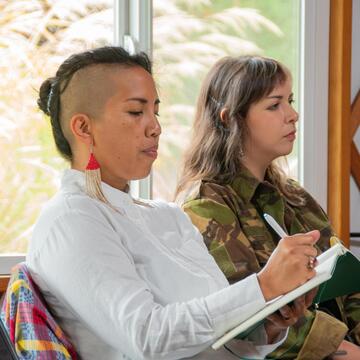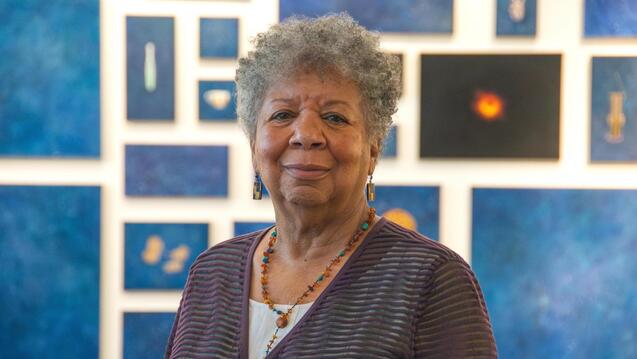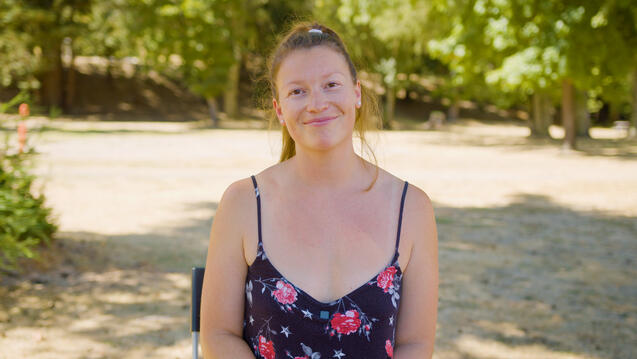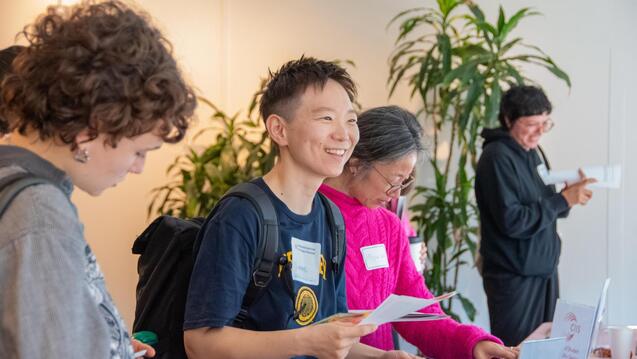The Division of Community Engagement and Belonging highlights the work of Shirley Strong, Beloved Community Consultant and Former CIIS Dean of Students.

28 Days of Blackness: Origin Stories
Learn the origins of CIIS' 28 Days of Blackness event
28 Days of Blackness began in 2015 with Ahmunet Jordon 13’ and Brandon Maurice Williams as the event's co-founders. Ahmunet attended CIIS from 2009-2013 and worked as a program coordinator with the Master of Fine Arts Program in Writing and Consciousness from 2013-2016. Brandon was also a Ph.D. student at CIIS from 2013-2015.
They saw the need for 28 Days of Blackness and found a community of allies and accomplices who encouraged and supported them in making this month-long event possible. Some of those early collaborators included: Denise Boston, Kathy Littles, Rachel Bryant, Carolyn Cooke, Arisika Razak, Dr. Adeeba Deterville, Shirley Strong and everyone in admin at CIIS that worked behind the scenes in finance, public programs, operations and communications.
We invited Ahmunet and Brandon to share the event's origin stories as they remember it, and to reflect on what it means to them today.
What inspired you to begin 28 Days of Blackness? What were some of the challenges and joys that led to the first event?
Ahmunet: 28 Days of Blackness was a collaborative effort between multiple departments. To name a few, MFA, Community Mental Health, Anthro and DEI, which was chaired by Denise Boston at the time. I believe 28 Days of Blackness was inspired by multiple events. The Black Lives Matter movement swept the country, which forced institutions, organizations and communities to address systemic racism. Since I have been in the CIIS community, there has always been a strong community of active Black voices. So, I can honestly say, we were ready and it was a long time coming.
I remember Carolyn Cooke and I sitting in our office thinking of how the MFA department could contribute. At that time, in the MFA department, we were also spearheading new collaborative projects so it just made sense to go big and create events only centered around Blackness! Since I had already been at CIIS for a number of years I knew chairs, admin, faculty and students from various programs. I reached out to each of them for support and funding. Carolyn knew that getting as many departments involved meant more money, support and visibility. I pulled together a list of Black artists, educators, and organizers from the Bay to participate.
The challenges were the logistics – as you can imagine. Organizing invoices, W-9’s– all of what I considered the “boring” stuff. It was extremely challenging being the main organizer for 28 days worth of events, material and content. The joys were being in community. Just simply breaking bread with all of the Black folx and seeing so many different reflections. I loved bringing the outside community into CIIS– some of which had never been inside the institution. Did I mention that ALL participants were Black? All the facilitators, caterers, artists and healers. Our Black Brunch was catered by Simply Bliss owned by Chef Yulonda Hendrix, who passed away in 2018.
Brandon: I think many Foundational Black Americans have questioned how the selection of the month of February, the month with the least amount of days was labored with honoring the history of Black people, the oldest people on the planet. Yet for me, meeting the challenges of being African American in a predominantly white institution like CIIS, where the void of Black and African Diasporic knowledge was palpable, using those 28 days felt like a necessary radical act, an opportunity to shine a beautiful light on Blackness.
What was the community response to 28 Days of Blackness?
Brandon: As the initial program was being built up, the response from the community (students and staff) was that of excitement and desire to learn. I remember being somewhat surprised at how well attended the venues were. It was a good month.
Ahmunet: From what I could tell the community was really excited, inspired and grateful. We received nothing but positive feedback and praise.
What response (if any) do you have to folx who wonder why other BIPOC communities don't have similar events at CIIS?
Brandon: Hard question to answer but if I were to speculate, I think the answer lives in how Black people do not have any other choice than to show who we are because the modus operandi of our country is historical anti-Blackness. James Baldwin once said, “to be a negro and even relatively conscious is to be angry all the time” and I think that if that is true, revealing our consciousness is not only transformative it’s an act of healing.
Ahmunet: For the folx who wonder why other IPOC, purposefully leaving out the “B”, communities don’t have similar events at CIIS – I honestly can’t tell you. What I can say is that CIIS again has had a history of active Black/African-American and African-Diaporic students that have always been committed to making sure our voices are heard. That doesn't mean it was easy. It has meant seeking support and allyship all throughout the institute and being our own best advocates, even if that meant you are the only Black body in the cohort. I never cared what program, what title, or what position when I saw another Black being at CIIS. I talked to them, communed, and we shared our stories. One of the first people I met at CIIS was Shirley Strong, former Dean of Students and a Black woman. Before I met Kathy Littles, even before there was this booming presence of “diversity.” Shirley is the one who held most of our stories and opened the door for a lot of Black students to complete their undergraduate degrees.
I use quotes for “diversity” because it is a tricky word. In my experience “diversity” has been used as a placeholder for anyone who is not white but often leaves out the Black experience and people.
What are you most proud of related to this event?
Ahmunet: I am most proud of the people who are still carrying on 28 Days of Blackness. I feel incredibly proud and honored to be part of this legacy, especially alongside the brilliant other Black women at CIIS. This feels like a gift.
Brandon: I’m most proud of the naming of the event, 28 Days of Blackness because, similar to Joseph Campbell hero’s journey, those four words are a call to arms, a call to academic and community spaces across the nation to do their 28 Days of Blackness.
What are your hopes for 28 Days of Blackness this year and in the future?
Brandon: My hope is that 28 Days of Blackness continues at CIIS in by doing so creates a consciousness that manifests a safer place for Black bodies at CIIS.
Ahmunet: My hope is that the legacy of 28 Days of Blackness continues, unifies and takes up all the space it deserves!
At the Division of Diversity, Equity, and Inclusion, we are grateful for Brandon and Ahmunet's vision and contributions. 28 Days of Blackness has become an annual CIIS experience, and we recognize that it wouldn't have been possible without their ideas, organizing, and labor.
Related News
Marine Corps veteran Bre Butler discovered a path to healing and transformation through CIIS' Integrative Health Studies program after five years of active duty service.
This fall, 483 new students began their academic journeys at CIIS with hybrid orientation experiences designed for connection and reflection.



